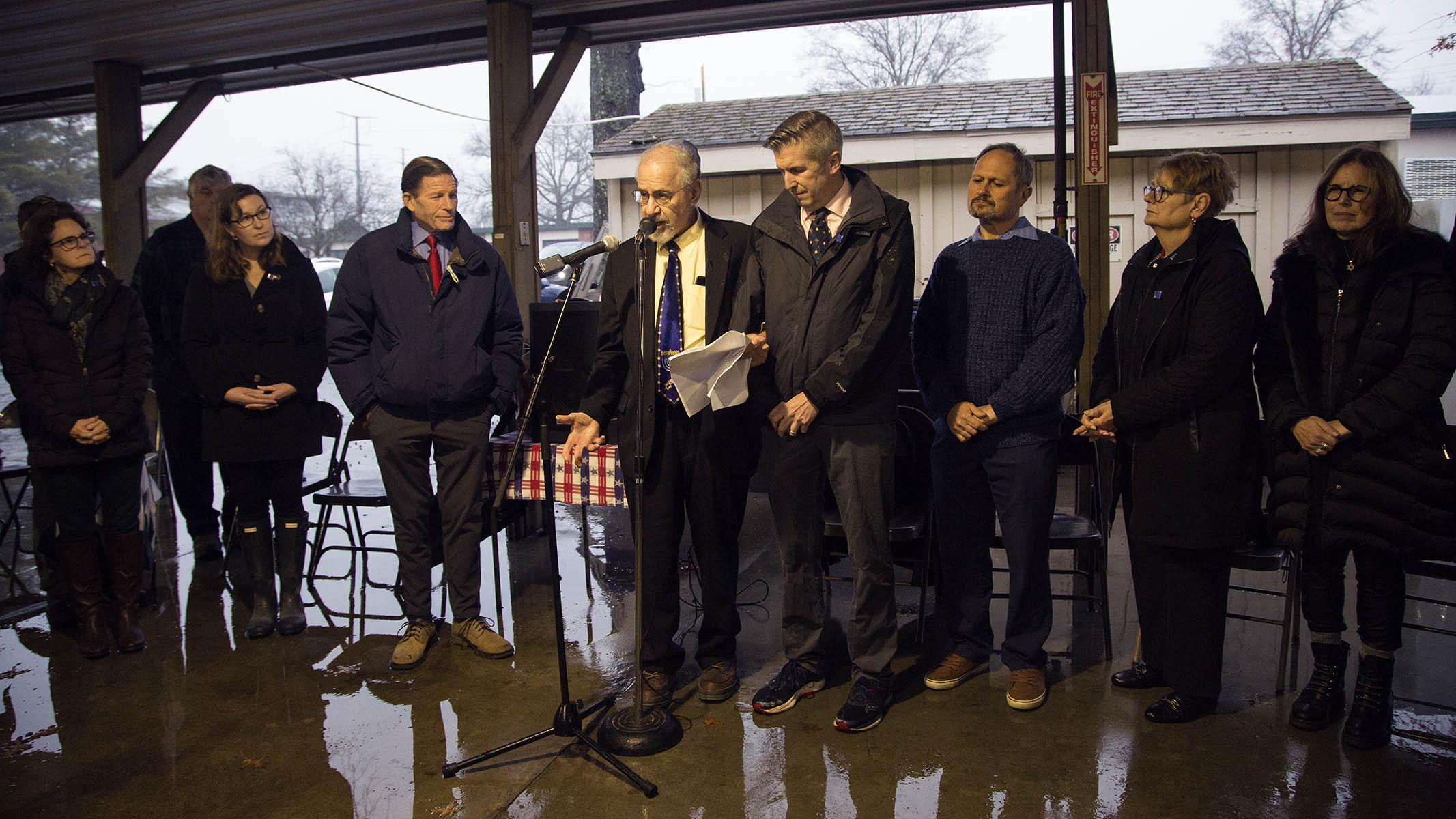By Brandon T. Bisceglia

Rabbi Alvin Wainhaus of Congregation Or Shalom speaks on Dec. 10 while flanked by state and local leaders during a vigil against hate and antisemitism at High Plains Community Center in Orange. Photo by Lexi Crocco.
Members of the Orange community braved harsh weather to take a stand against antisemitism and hate during a vigil on Dec. 10 outside the High Plains Community Center.
Heavy rains did not deter over 100 people from attending the event, which featured faith leaders from the area along with local and state politicians.
US Sen. Richard Blumenthal drove up from his home in Greenwich to speak at the vigil. Blumenthal, who is Jewish, talked about his father coming to the US in 1935 to escape persecution under the Nazi regime with the hope that his new country would give him a chance. He related how his father had warned him that the same kind of hate could occur here.
“He also warned me, when I said to him it can never happen here, that it can happen anywhere,” Blumenthal said, “because there’s hate everywhere. And it will happen if good people don’t stand up.”
Blumenthal said there was a “throughline” of hate connecting incidents around the country, citing the killing of a 6-year-old Palestinian boy in the Chicago area in October, the shooting of three Palestinian students in Vermont in November, the defacing of various houses of worship and the Yale student who climbed up a menorah on the New Haven Green on Nov. 9 to stick a Palestinian flag to it.
He called the current rise in hate “a moment of more peril and danger than I can recall at any time in my life.”
Other speakers echoed that sentiment. Gayle Slossberg, CEO of the Jewish Federation of Greater New Haven and a former state senator for the district in which Orange sits, said she never thought she would have to be giving such a speech about antisemitism as she was delivering.
“My kids say to me, ‘Mom, can I wear my Jewish star out in public? Am I safe?’ I’m saying this out here publicly because this is what we’re saying at home around our dining room tables,” Slossberg said.
She added that many Germans in the 1930s ignored the rise of antisemitism in their country, thinking that it wasn’t their problem.
“We’re at that place where we get to rewrite the ending to this movie,” she said. “Call out antisemitism and hate when you see it. Do not be afraid to stand up and say, ‘Hey, that’s not okay.’”
First Selectman Jim Zeoli described how the tendency to avoid responding to hate could also extend to local leaders. He said that he had decried the Oct. 7 terror attack that Hamas had carried out in Israel during the announcement portion Board of Selectmen meeting that following week.
“It was just shocking because everybody there wanted to say something, but we didn’t know whether we should or not,” he said.
Zeoli added that much of the hate he has seen around him in his life has stemmed from misguided beliefs and jealousy of others.
“There’s no room for that – certainly not in the town of Orange, not in the state of Connecticut, and it should not be in the United States,” he said.
Matthew R. Bailey, pastor at St. Joseph of Arimathea American National Catholic Church, said that he came to the vigil not just as a pastor, but as a fellow citizen who was troubled by the rise in hate he was witnessing.
“Our faith teaches us that every person is created in the image of God,” he said. “To harm another through deeds or words is to forget the divine imprint in each of us.”
Rabbi Alvin Wainhaus of Congregation Or Shalom in Orange pointed out that Hannukah is a holiday about hope in the midst of darkness. It purposefully falls in the darkest time of year, following not just the shortest period of daylight in December but the time of month when the moon is at its dimmest.
“We gather because we refuse to be paralyzed by the darkness. We gather to defy the darkness, to condemn the hate, to condemn the bigotry, to condemn evil, so that the hate will not be unanswered,” he said. “We gather as well to keep hope alive.”
Rabbi Michael Farbman of Temple Emanuel in Orange also spoke of hope in difficult times, relating the story of Rabbi Hugo Gryn, who was a child in Auschwitz during the Holocaust. When his father on Hannukah melted their meager margarine rations to fashion a makeshift menorah, Gryn protested that it was a waste of the tiny bit of food they had.
Gryn later said his father replied, “My child, we know you can live three days without water. You can live three weeks without food. But you cannot live for three minutes without hope.”
“Standing with each other in a time of pain, and acknowledging it, and pulling it out and saying we have to do better, fills me with hope,” he said.